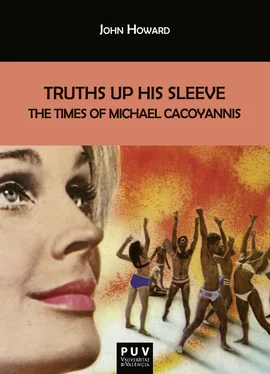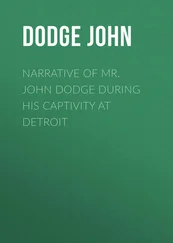Radical change threatens established institutions. The Michael Cacoyannis Foundation in Athens resists such interpretations of his oeuvre. They have impeded this study but not stymied it. Aligned with distant relatives’ concerns as expressed in interviews, my requests to see my subject’s diaries—an essential component of most biographies—went unanswered once, twice, thrice. Next, an official stated that Michael’s personal writings were part of a private archive sealed to both general public and scholarly researchers. Finally, another claimed no such diaries exist. Michael anticipated these shenanigans and took steps to mitigate them. Among additional truths up his sleeve were his repeated injunctions to look closely at the films and plays, to discover the ways they both cloak and reveal. They protected project participants, as was appropriate for his era, but more so they divulge, as is necessary for ours. Thereby, Michael insisted, his life and times would be comprehensible—and, as it turns out, empowering. However frustrating, workarounds can enable. Michael’s taboo censored subject matter nonetheless found vast international audiences. This modest unauthorized biography has managed to find a readership too. 9
For everyone who watches “classic” film or consults IMDb, for anyone who supplements contemporary theatre going with immersion in ancient and modern drama, Michael’s life and times are instructive. They help us answer any number of ethically charged questions. How could a not-so-ordinary boy born and raised in Cyprus become a national treasure in Greece? How could a pacifist in World War Two London complete his law degree and evade social stigma while never enlisting in the armed forces? How could a wartime then postwar BBC radio producer, moonlighting as a stage actor-director, break into the film industry? How did this budding screenwriter-director of feminist inclinations build on successes at Cannes and Edinburgh in the 1950s to reach the pinnacle of popularity off Broadway and in Hollywood in the 1960s? During the Cold War lavender and red scares, how could a gay liberal and fellow traveller avoid police persecution and employment discrimination to achieve all this and more? How did he become not only the era’s foremost interpreter of ancient Greek drama but also a modernist filmmaker of international renown? How could this admired “women’s director,” rumored to be gay, avoid jail and job discrimination to keep working? How could a flamboyant auteur with many communist colleagues forestall blacklisting as a leftist sympathizer? How could a wildly creative director of film, drama, and opera—time and again praised, then slayed by vicious homophobic reviews— continue to get out of bed in the morning and make films that found large global audiences? What inspired him? How did an underdog from the back of beyond navigate the corridors of cultural power in London, Los Angeles, New York, and Paris? In the final analysis, how did he stave off his most venomous critics— snooty elites, family members, and his own lacerating self-assessments?
Simply put, Michael persevered. By any reckoning, his long productive life of nine decades is a testament to strength of will, resilience under duress, courage despite hardship, loving friendship amidst animosity. When all hope was lost, he would not be defeated.
*
Part I argues that Michael grew up gay in a violently homophobic world, but he found a measure of freedom and greater outlets for creativity in midcentury London. Chapter 1 shows that on the small, poor, multiethnic island colony of Cyprus, Michael enjoyed many advantages as a child of the aspiring middle-class, even as he suffered brute bullying and corporal punishment. Cinema, movie magazines, broad reading, and cabaret culture gave him glimpses of lives less ordinary, worldviews more expansive, progressive, and transformative. Chapter 2 demonstrates that in London, Michael obeyed his father’s orders to study law, but he became willful then disobedient, turning to work in theatre and cinema, as well as radio and television broadcasting. With London’s voice coaches and stage instructors, he honed his abilities to sing, act, and direct, achieving remarkable success, while fending off racist, sexist, and homophobic critics. Chapter 3 makes clear why Michael never again lived in Cyprus. The U.S. lavender scare’s well-documented war on gays went global, following the contours of American and British empires, with distinctive viciousness in late colonial Cyprus. While modern medicine classified nonconforming genders and sexualities as diseased, church and state combined to condemn deviants and to punish them in the press and prisons.
Part II charts Cacoyannis’ rise as a cosmopolitan filmmaker, creating an increasingly sophisticated body of work noted for its minimalist auteur aesthetics and broad popular appeal. As Chapters 4 and 5 prove, over the twentieth century, successive generations of theatre, film, radio, and TV producers developed crafty codes of queer representation to avoid censorship, job loss, and jail. After sexy silent movies and pre-Code talkies, before the 1990s new queer cinema, midcentury makers faced intransigent structures of oppression. Defiant against these forces, Michael’s team inherited and mastered practices of euphemism, double entendre, partial disclosure, and selective visibility. Then Michael invented new codes, adopting thrifty methods from Africa and Asia, adapting them for Europe and America. As Chapters 6 and 7 elucidate, in the high stakes and low moments of multinational corporate cultural production, international renown could be followed by wholesale condemnation. After Michael’s acclaimed adaptation of modern literary masterpiece Zorba the Greek , he courageously wrote, costumed, and filmed a futuristic screenplay of his own, with complex intersecting themes, all widely derided. Hollywood’s biggest bomb coincided with the colonels’ coup in Greece, and Michael went into self-imposed exile in France.
Part III details Michael’s return from exile, his ever more assured position as a top international filmmaker, and his renewed commitments to translating and directing stage plays, plus opera, across Europe and America. As with his films, the plays and operas emphasized resistance to political tyranny, religious orthodoxy, sexual conformity, and the gender binary. Chapter 8 demonstrates how the creator of the acclaimed modern Greece quintet of films became equally renowned and celebrated for his Euripides trilogy of ancient antiwar plays, adapted for both stage and screen. Chapter 9 tracks Michael’s personalized engagements with high politics and international diplomacy, as first Chile then Cyprus suffered violent military overthrows aided and abetted by the United States. Chapter 10 assesses Michael’s late life stage commitments in Athens and Epidaurus, as it further probes his final two films, inspired respectively by the new queer cinema and a master Russian playwright.
Throughout, the book examines Michael’s fraught familial relations in tension with his expanding queer network of intimates and colleagues, described by “good friend” Candice Bergen as “writers, composers, artists, lawyers of the left.” The book’s epilogue shows the surprising steps Michael took near the end of his life in an attempt to protect the legacy of his oeuvre’s queer, feminist, and humanist ideals. It further demonstrates how his family of origin yet again tried to thwart him, at his death and long after. In spite of it all, Michael could rest assured and rest in power. His vast body of work would continue to reach wider audiences who grew ever more skilled in decoding and interpreting his intricate narratives. An artist both attuned to his times and attentive to utopian possibilities, Michael Cacoyannis helped to lay foundations for bold new cultural developments in the third millennium. 10
Читать дальше











